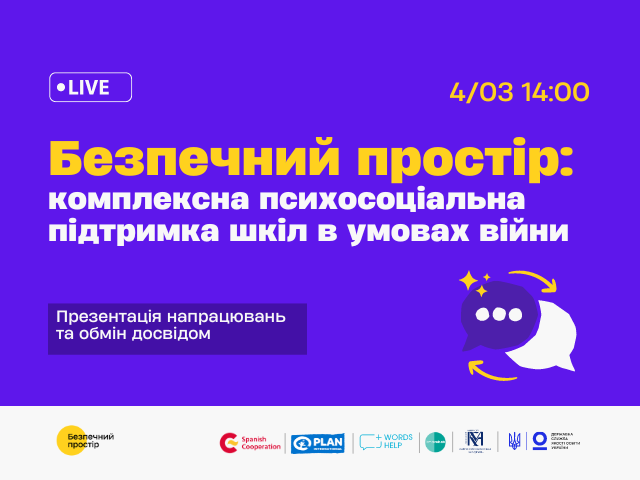
4 March 2024 the conference "Safe space: comprehensive psychosocial support of Ukrainian schools in the conditions of war". The purpose of the event was to sum up the activity"Safe Space" psychosocial support programs for two years of full-scale war, exchange of experience of program implementation participants, presentation of research results and discussion of plans for scaling up the program in Ukraine and Europe. The conference was organized by the NGO "Words help" andThe Center for Mental Health of the Kyiv-Mohyla Academy in partnership withThe State Education Quality Service of Ukraine with supportPlan International and financial support from the Spanish Agency for International Cooperation and Development (AECID).
"Safe space» is a psychosocial support program for schools and kindergartens, developed by psychologists of the Mental Health Center of the Kyiv-Mohyla Academy.
During the two years of the full-scale war, the "Safe Space" program was trained 7885 teachers, 414 school psychologists and covered 2020 schools from all over Ukraine. It provides such dataGrigory Baran — project manager "Safe space: comprehensive psychosocial support of Ukrainian schools in the conditions of war".
"Today we are doing our best, for this program to be continued. We would not like to stop, because the war continues and the psychological state of children suffers from the actions of the aggressor. When we tested students 6 and 8 classes, we saw in the open answers of our students and teachers, what is the most, in their opinion, it is the psychological state of the students that affects the learning results. Therefore, I am convinced, what that, what we will do and have done within the scope of this project, is one of the key conditions for improving the quality of education", - notedRuslan Gurak, head of the State Education Quality Service of Ukraine.
"Plan International is a development organization, so it was a great pleasure and a great honor for us to support such a project", - saidDenis Dubrovkin, program manager of Plan International.
"Currently, the concept of a psychologically safe environment is a priority of the Ministry of Education and Science of Ukraine, and we are working on it together with the Ministry, to implement practices in schools, activity, which allow maintaining the mental health of participants in the educational process, make school space, educational institutions safe and such, which is aimed at development", - saysAnastasia Holotenko, expert of the mental health coordination center of the Cabinet of Ministers of Ukraine.
The conference consisted of three sections, in which speakers were the participants of the implementation of the program.
During the first section, the organization of a safe psychosocial educational space for teachers and children and the training of teachers were discussed. The authors of the program took part in the section, national coaches, as well as teachers, who implemented the program in their schools.
Sergiy Bogdanov, headCenter of Mental Health of the Kyiv-Mohyla Academy, shared the results of a study on the implementation of the "Safe Space" program in work with teachers.59% teachers noted an increase in the effectiveness of engaging students. 46% teachers reported positive changes in their interaction with students. 57% teachers felt an improvement in their well-being (reducing the level of burnout): the biggest changes occurred according to the indicators "emotional exhaustion" and "decrease in personal success". That is, teachers began to feel more energy, they feel better emotionally and physically, and it helps them to keep in touch with the students.
Iryna Hayduk shared her experience of using "Safe Space" methods in working with students, teacher of Poltava Lyceum No. 6 "Leader":
"An ordinary lesson turns into a game, but I don't regret it one bit. She approached in a different way, example, to the study of Taras Shevchenko's poetry "The cherry orchard around the house". And the game "Draw a mood" turned into a game "Draw a poem". Children learned the poem faster and better. Less time was spent on homework… The game is fun and a resource for both students, as well as for teachers. Therefore, I am personally grateful to the authors for the received collection of games. For me, this is a very important book in preparation for lessons and hours of communication…
As a wish, I think, similar trainings should be made mandatory for every teacher, regardless of subject and age category…
Some more impressions about sharing. His place is important and great… An example is a lesson on describing a favorite pet: everyone is working, and now I notice great sadness and even tears in Vanya's eyes. I approach and say "Sometimes in life it happens, that we get upset. Do you want to talk about it??». And the child opened up - when they were leaving Mariupol, then they could not take a dog of the diver breed with them. Children supported, shared their stories. But the most important thing at that moment is the valuable support of classmates and the teacher. I am happy about that, that I can create a space of trust and support for students, that they are heard, that warm and cozy communication reigns here. I can saturate each lesson with play and simply be a person of trust for my students and colleagues.".
During the second section, the authors of the program, national trainers and school psychologists discussed the experience of implementing group psychological work with children during the educational process at school.Oksana Zaleska, co-author of "Safe Space", spoke about the training program for school psychologists and moderated the section.
Alla Zinich spoke about the impact of group remedial classes on children, a psychologist at the Lyceum "Harmony" in the city of Boyarka, participant of the "Safe Space" program:
Thanks to the help of Infopulse-Ukraine LLC, all premises of the Center were repaired.…The third group was special. These are children of parallel fifth grades, teenagers. Some students had parents at war. With them, I chose the "space of my changes" module. The first lesson was not easy: worried faces, some had questions "why are we here", "why do we need it". Already in the third session, the emotional state of the children improved, gradually entered the program. I liked the exercise "cooking pizza" the most, moving games, exercises with metaphorical cards.
There was one boy in the group, who refused to participate. I invited him to sit and watch. When conducting the "safe place" exercise, he agreed to work. After the exercise, he burst into tears, told that he really wants to go home to the Donetsk region, to your house. The group supported him, other children told their stories, made it clear, that he is not the only one here… The emotional state of children improved, parents of some students gave positive feedback. Class teachers also noticed the changes. Children, who were involved in the project, shared experiences during educational hours…
Talking with children, I understood, that such classes are very necessary for them. After all, our children had a difficult experience. I'm glad, which became a support for them. I feel, that children need it, that they trust me, and it is very valuable to me".
At the end of the discussionSergiy Bogdanov sharedthe results of the study on the implementation of the program in working with children. The program is most effective for children, who have pronounced symptoms of psychological trauma. It was among these children that the results of the survey showeda significant reduction in the level of PTSD symptoms in 91,3% children of age 8-10 years, and in 75,2% children of age 11-16 years. A more significant reduction in avoidance behavior was observed among boys, and among girls, the intensity of obsessive memories of the trauma decreased. Also, group psychological work strengthened all indicators of children's resilience at a statistically significant level.
During the third session, the scaling of the Safe Space program was discussed. A methodology for the objective assessment of inner selvesSergiy Bogdanov andKsenia Brukhovetska talked about the experience of implementation in European countries: of Poland, of Austria, Moldova and the Czech Republic. The author of the programOksana Zaleska shared her experiences in implementing the program in preschool institutions and working with students.
Sergiy Bogdanov argued for the importance of scaling up the Safe Space program:
– the effectiveness of early intervention programs is important, so that children get help as early as possible,
– psychological recovery and prevention of mental problems in the future,
– children's involvement in learning and increasing learning efficiency,
– strengthening of mental well-being among teaching staff.
Grigory Baran, project manager "Safe space: комплексна психосоціальна підтримка українських шкіл в умовах війни» підводячи підсумки конференції, підкреслив необхідність якомога раніше, ще з дошкілля, створювати безпечний простір. Також він наголосив на важливості залучення студентів до таких програм як «Безпечний простір», щоб майбутні фахівці отримували передовий та інноваційний досвід у сфері психосоціальної підтримки та застосовували набуті знання у своїй роботі.











